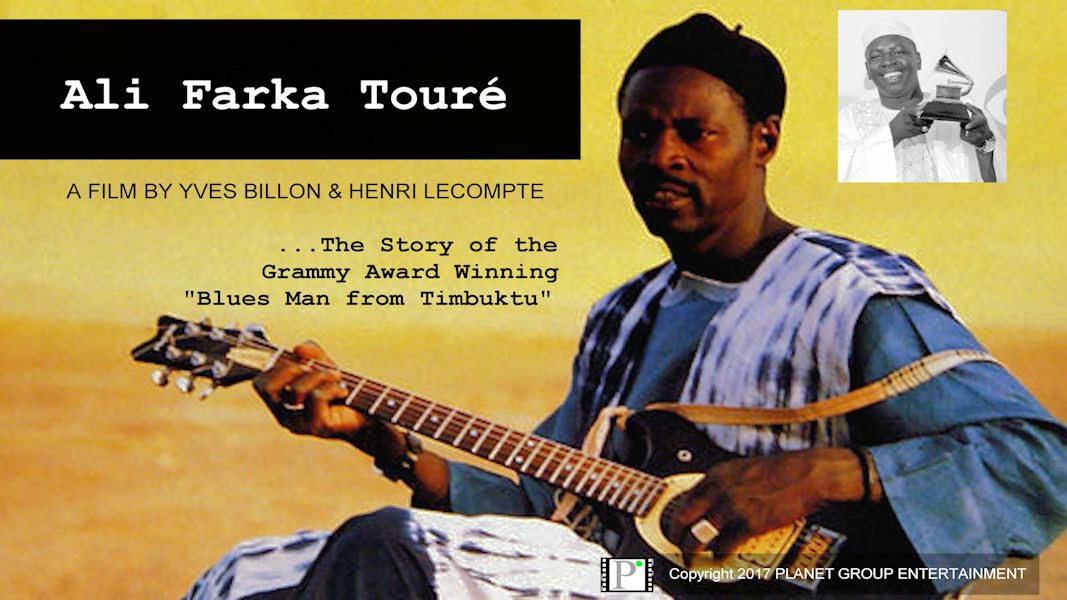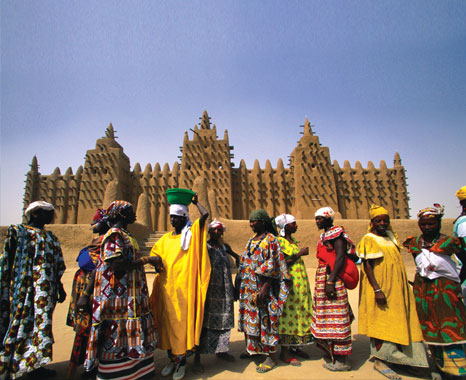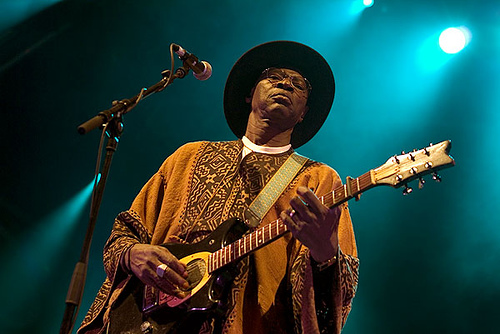Ali Farka Toure for Library Distribution
 Saturday, March 3, 2012 at 03:39PM
Saturday, March 3, 2012 at 03:39PM 
Springing from the Roots...Ali Farka Toure....‘The Blues Man from Timbuktu
Ali Farka Touré, the gifted musician and farmer, came from Timbuktu. Yes, there is a place called Timbuktu and it’s in Africa, in the loop of the Niger to be precise. As a child Ali never learned to read or write, but his early passion for a home-made one-string, violin-like instrument led him away from his humble roots to the music festivals of Europe in the 60’s.

Playing the 'Gurkel' the traditional one-string instrument of Mali.
Watch the trailer here:
ALI FARKA TOURE_TRAILER_1080_EN.MP4 from sarasotafringefilms on Vimeo.

READ THE VIDEO LIBRARIAN REVIEW HERE
Considered to be 'The African John Lee Hooker', Ali was born in 1939 in Gourmararusse (in the Timbuktu region), Mali, into the noble Sorhai family. Being of noble birth, he should never have taken up music. His family disapproved because the musician profession is normally inherited in Malian society and the right to play belongs to the musician families. However, being a man of determination and independence, once he decided to take up music, there was no stopping him.
 In 1994 Ry Cooder collaborated with Ali on his album 'Talking Timbuktu'.
In 1994 Ry Cooder collaborated with Ali on his album 'Talking Timbuktu'.
Ali took up the guitar at the age of ten, but it wasn't until about age 17 that he really got a handle on the instrument. In 1950 he began playing the gurkel, a single string African guitar that he chose because of its power to draw out the spirits. He also taught himself the njarka, a single string fiddle that is today a popular part of his performance. Then in 1956, Ali Farka Toure saw a performance by the great Guinean guitarist Keita Fodeba in Bamako. He was so moved that he decided then and there to become a guitarist. Teaching himself, he adapted traditional songs using the techniques he had learned on the gurkel.
A bit of new-found wealth afforded the purchase of an acoustic guitar and for Ali, the instrument changed his world.

Beautiful Bamako! Now being destroyed by Islamic Terrorists supported by Al Qaeda.
During a visit to Bamako in the late 1960's, Ray Charles, Otis Redding and most importantly John Lee Hooker introduced Ali Farka Toure to African-American music. At first, he thought that Hooker was playing Malian music, but then realized that this music coming from America had deep African roots. Ali was inspired by Hooker's strength as a performer and began to incorporate elements into his own playing. During those years he composed, sang and performed with the famous Troupe 117, a group created by the Malian government after the country's independence.

Grammy winner Ali Farka Toure.
Today, he’s recognized internationally for his unique sound. Critics and fans alike have compared his music to the Soul-Blues magic of greats like B.B. King, John Lee Hooker...even Eric Clapton. Ironically he had never heard their “sound” before creating his music. Amazingly, his sound is authentic Blues....and through it, we can hear the native roots, the origins of the Afro-centric rhythms found in Soul, Blues and Jazz!

Afro-centric sounds, which found their way across the seas to America during the era of slavery, preserved and transformed into modern Jazz, are the essence of Ali’s music.
Winner of The San Francisco Golden Gate Music Award, the film takes us beyond the sound, and deep into the personality and heart of the man. A true son of the soil, Ali shared all with his extended family. For him the joy was just to be alive and you hear it coming through his music and lyrics. A mobile camera follows him from concerts in Bamako to voodoo cults dedicated to the ‘Spirits of the River’, going through the Tuaregs camps...all the way to the most mysterious city of Timbuktu.
World Music Lovers in Brooklyn, Dublin, Leeds, Bordeaux, Stuttgart...any corner of the world that loves ‘Blues’, knows the music of Ali. This award-winning film from Yves Billon and Henri Lecompte reveals in a charming and delightful manner the irony of an original, a man not influenced by western sound, schooled on an ancient-ethnic instrument.
According to Video Librarian...
What schools or colleges is this film appropriate for?
Ali Farka Touré… The Blues Man From Timbuktu is an excellent choice as an educational resource for any college but is especially recommended for conservatories or music departments in academic libraries for universities or high schools.
What academic library shelves would this be on?
African Culture, Music, Roots Music, and Biography library shelves at universities would be the best fit for Ali Farka Touré… The Blues Man From Timbuktu.
![]()
NOW Streaming on KANOPY
Ali Farka Toure...Springing from the Roots DVD and File Purchase Options
If your system is not PayPal “friendly”, we will accept your purchase order or send you an invoice payable by check or credit card. For details on purchase orders, please contact: nagle.patrick@gmail.com
A Note About Our Academic and Institutional Pricing
Educational DVD with PPR: $150
Anytime you want to screen a film on campus, Public Performance Rights (PPR) need to be obtained. Copyright law (USC 17§101) defines a public performance as occurring in a public space or if it is in any place if "a substantial number of persons outside of a normal circle of a family and its acquaintances" is gathered there. This would include classrooms, meeting rooms, auditoriums, dorm lounges, etc. However, copyright law (USC 17§110) also provides an exception for face-to-face teaching activities in a nonprofit educational institution.
Digital Site License with PPR: $200
A DSL grants educational institutions and/or non-profit organizations a limited license to host and stream a film online to students, faculty and staff on their password-protected server. This license is granted for three years. The key advantage of purchasing a DSL is that once uploaded, an unlimited number of viewers can access the film from multiple locations simultaneously.
DVD + DSL bundle PPR: $225
K-12, Non-profit, Public Library with PPR: $62.50
Personal DVD $24.50
